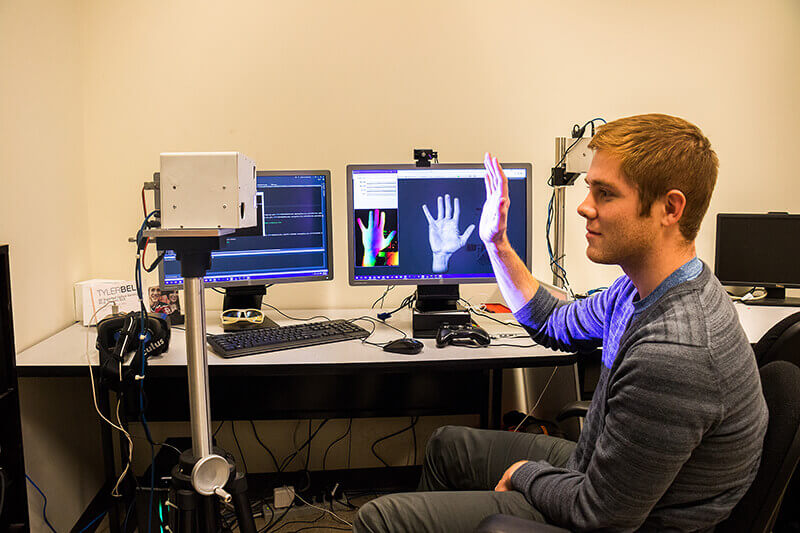February 14, 2019
Relieving the pain and time of sharing 3D video content
 Holostream, a platform created by Purdue’s Song Zhang, uses a new pipeline for 3D video recording, compression, transmission, decompression and visualization. (Image provided)
Download image
Holostream, a platform created by Purdue’s Song Zhang, uses a new pipeline for 3D video recording, compression, transmission, decompression and visualization. (Image provided)
Download image
WEST LAFAYETTE, Ind. – You might have a music video – and a Purdue University professor – to thank for making a future trip to see the doctor much easier.
Song Zhang, an associate professor of mechanical engineering in Purdue’s College of Engineering, was working on a music video and knew there had to be an easier way to share 3D content.
“It was a real struggle back then to compress and send the 3D video to the band,” Zhang said. “Now, we have come up with a platform that enables high-quality 3D video communication on mobile devices through standard wireless networks.”
The platform, called Holostream, drastically reduces the data size of 3D video without substantially sacrificing data quality. The technology allows transmission within the bandwidths provided by existing wireless networks.
“This kind of technology can be used for teleconferencing, manufacturing and many other applications,” Zhang said. “We are headed toward allowing a patient and doctor to interact over a mobile device, where the doctor would see a 3D version of the patient.”
Holostream uses a new pipeline for 3D video recording, compression, transmission, decompression and visualization.
The team developed both the hardware and software for the pipeline including a 3D video capture system. A 3D camera captures the images, using an LED light to project structured patterns of stripes onto the object being scanned. These stripes allow the system to determine the depth and shape of the object.
Zhang said his team is also exploring the uses of the technology for the teleoperation of robots. A user would be able to see in 3D real time the perspective of the robot.
Their work aligns with Purdue's Giant Leaps celebration, celebrating the global advancements in artificial intelligence as part of Purdue’s 150th anniversary. This is one of the four themes of the yearlong celebration’s Ideas Festival, designed to showcase Purdue as an intellectual center solving real-world issues.
The research has been funded by the National Science Foundation. Two patent applications have been filed through the Purdue Research Foundation’s Purdue Office of Technology Commercialization. Contact otcip@prf.org for more information on licensing a Purdue innovation.
About Purdue Office of Technology Commercialization
The Purdue Office of Technology Commercialization operates one of the most comprehensive technology transfer programs among leading research universities in the U.S. Services provided by this office support the economic development initiatives of Purdue University and benefit the university's academic activities. The office is managed by the Purdue Research Foundation, which received the 2016 Innovation and Economic Prosperity Universities Award for Innovation from the Association of Public and Land-grant Universities. For more information about funding and investment opportunities in startups based on a Purdue innovation, contact the Purdue Foundry at foundry@prf.org. For more information on licensing a Purdue innovation, contact the Office of Technology Commercialization at otcip@prf.org. The Purdue Research Foundation is a private, nonprofit foundation created to advance the mission of Purdue University.
Writer: Chris Adam, 765-588-3341, cladam@prf.org
Source: Song Zhang, zhan2053@purdue.edu

